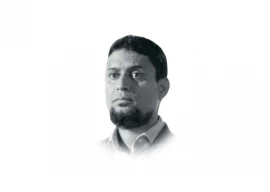
Global cooperation has become a necessity for the survival of humanity, but achieving it is increasingly challenging in an atmosphere of mistrust and reliance on outdated structures that fail to reflect today's political and economic realities. For a developing nation like Pakistan, the upcoming 'Summit of the Future' is an opportunity not just to address global challenges but also to position itself as a proactive voice in shaping the future of international governance. This summit offers Pakistan the chance to advocate for reforms that address not only its national concerns but also the shared interests of developing countries across the globe.
As part of the 75th anniversary of the United Nations, member states, including Pakistan, committed to strengthening global governance. The Secretary-General's response, through 'Our Common Agenda', called for enhanced solidarity between nations, people and future generations. Pakistan's role in this new multilateral system should be focused on leveraging its strategic position, addressing national vulnerabilities, and contributing to global solutions. The Pact for the Future, which will emerge from the summit, is an essential platform where Pakistan can offer practical recommendations and take the lead in areas crucial for both national and global progress.
For Pakistan, the summit in September 2024 presents an opportunity to make significant contributions across multiple dimensions. One critical area is sustainable development. Pakistan is most vulnerable to climate change, as evidenced by its ranking as the 5th most affected country in the Global Climate Risk Index 2020. The devastating floods of 2022 displaced over 33 million people and caused an estimated $30 billion in economic losses. Given these pressing challenges, accelerating the implementation of the 2030 Agenda for Sustainable Development is not just a global necessity but a national imperative for Pakistan. At the summit, Pakistan can propose the establishment of a Climate Resilience Fund for Vulnerable Countries, specifically targeting nations like Pakistan that face extreme climate risks. To enhance this proposal, Pakistan could further suggest a regionally focused adaptation and mitigation plan, engaging neighbouring countries such as Afghanistan and India, which face similar vulnerabilities. By doing so, Pakistan would not only seek aid but also position itself as a regional leader in climate diplomacy, ensuring a collective approach to shared risks.
Additionally, Pakistan can recommend a more inclusive international financing system that supports sustainable development for low- and middle-income countries. Pakistan's external debt stands at $130 billion, and debt servicing alone consumes a significant portion of the country's annual budget. In this context, Pakistan could advocate for a Debt Relief Mechanism for Developing Nations, ensuring economic stability for countries with high debt burdens. To make this recommendation more actionable, Pakistan could propose debt-for-climate swaps, whereby a portion of debt is forgiven in exchange for investments in climate adaptation projects. This would not only ease the financial burden but also align debt relief with critical climate action, making the proposal highly relevant for both Pakistan and the global agenda.
In the realm of international peace and security, Pakistan's long-standing experience in peacekeeping makes it uniquely positioned to offer practical recommendations. Pakistan can propose regional peacebuilding initiatives that focus on both traditional and non-traditional threats, such as climate-induced displacement and cross-border water conflicts. Pakistan has demonstrated its ability to manage cross-border water disputes through the Indus Water Treaty with India, which remains one of the most successful water-sharing agreements in the world. Drawing from this experience, Pakistan can lead discussions on establishing cooperation frameworks that address similar climate-stressed challenges globally. Furthermore, Pakistan should advocate for greater emphasis on climate-security linkages in global security frameworks, urging the UN to prioritise climate adaptation within security discussions, ensuring that climate-exacerbated conflicts are addressed pre-emptively.
Another key area where Pakistan can make a significant contribution is in digital cooperation and technological innovation. While Pakistan has made strides in expanding internet access, the country still faces significant digital disparities, with only about 36% of the population having access to the internet as of 2022. Rural areas, in particular, lag behind urban centres in terms of digital infrastructure. At the summit, Pakistan can advocate for a Global Digital Equity Initiative, aimed at closing the digital divide in developing countries by promoting affordable internet access, strengthening data governance, and expanding digital literacy programs. To make this recommendation more actionable, Pakistan could propose a South Asian Digital Cooperation Framework, focusing on rural digital inclusion and empowering women in technology, addressing the gender gaps and rural development challenges that Pakistan faces.
Pakistan also has an important role to play in shaping the youth and future generations agenda. With its 60% population under the age of 30, Pakistan has a vested interest in ensuring that global standards for youth engagement are implemented. The youth unemployment rate in Pakistan, standing at over 8% in 2023, highlights the urgent need for job creation programmes. At the summit, Pakistan could propose a Global Youth Empowerment Fund that would provide resources for education, health, and employment opportunities, particularly focusing on green and digital economies. Additionally, Pakistan could advocate for vocational training and upskilling programmes as part of this fund, ensuring its youth are prepared for the jobs of the future. This would not only address the immediate challenge of youth unemployment but also align with global trends toward sustainability and digital transformation.
Finally, the summit is a crucial opportunity for Pakistan to contribute to the reform of global governance itself. Pakistan can advocate for an inclusive and representative Security Council, where developing nations, including itself, have a greater voice in decision-making. Rather than making a broad call for reform, Pakistan could propose specific structural changes, such as a regional rotational seat for South Asia or the Muslim world. This would ensure that the Security Council better reflects the geopolitical realities of today and provides a platform for developing nations to have a meaningful say in global security matters.














COMMENTS
Comments are moderated and generally will be posted if they are on-topic and not abusive.
For more information, please see our Comments FAQ